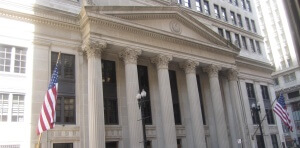Igor Oystacher faces prosecution for spoofing in Chicago
Chicago judge rules that spoofing is unconstitutional as the end of the road approaches for Igor Oystacher.

After eight months of legal wrangling, a trader who was accused in October of engaging in the dubious practice of ‘spoofing’ when trading on some of the largest electronic derivatives and futures exchanges in the world, may now find himself the subject of a court order.
Yesterday, the U.S. Commodity Futures Trading Commission (CFTC) explained to Illinois federal judge Amy St. Eve who was overseeing its case against Igor Oystacher that the statute’s language describing the crime is constitutionally clear.
Spoofing, which is often conducted via disruptive algorithmic trading entities employed by traders to outpace other market participants and to manipulate exchange-traded derivatives markets.
Spoofers feign interest in trading futures, stocks and other products in financial markets creating an illusion of exchange pessimism in the futures market when many offers are being cancelled or withdrawn, or false optimism or demand when many offers are being placed in bad faith.
This practice has become quite a concern for the CFTC recently, as more individuals with seemingly low levels of resources have begun to employ devices that have successfully manipulated markets in this fashion. Usually, spoofing involves placing a bid or offer with intent to cancel before the orders are filled.

The flurry of activity around the buy or sell orders is intended to attract other high-frequency traders (HFT) to induce a particular market reaction such as manipulating the market price of a security. Spoofing can be a factor in the rise and fall of the price of shares and can be very profitable to the spoofer who can time buying and selling based on this manipulation. Under the 2010 Dodd-Frank Act spoofing is defined as “the illegal practice of bidding or offering with intent to cancel before execution”, giving rise to the censuring by the CFTC of those suspected of engaging in it.
As is often the case with traders attempting to bend the rules, an alias was used in the case of Mr. Oystacher, who was known as ‘990’ before his real identity was discovered.
Clearly, the old adage that by working for a large company, an employee is ‘just a number’ is indeed very poignant in this instance, as Mr. Oystacher adopted this as his identity, it being the identification code assigned to the company that he worked for in 2004 when the chief dealer at Kingstree Trading LLC in Chicago noticed something very unusual in the Standard & Poor 500 futures market.
The dealer scrutinized the market activity and observed as ‘990’ created an unprecedented display of market manipulation.
At that point, the dealer alerted a senior executive at the company and when the mainstream news agencies discovered this, both men refused to be named for fear of retribution.
By the end of 2004, ‘990’ had become a feared entity within the derivatives exchanges of Chicago. The forums and message boards became awash with references to these three numbers, and many traders and industry professionals petitioned the Chicago Mercantile Exchange (Now CME Group) to put a stop to this trader’s access.
Investigations were made and the true identity of the culprit was revealed to be a young Russian man who had dropped out of Northwestern University to work for Chicago-based proprietary trading firm Gelber Group LLC.
Some rather astonishing 11 years after Mr. Oystacher had begun his spoofing spree, the CFTC filed a complaint against him and his firm, 3Red Trading LLC, accusing him of cheating on some of the largest futures exchanges in the world.
It took 11 years to do this, because at the time of Mr. Oystacher’s activity, the Dodd-Frank Act was non-existent and it was only post-2010 that spoofing became recognized as unlawful post implementation of the Dodd-Frank Act.
Even so, Mr. Oystacher’s original complaint in October last year has resulted in a long, drawn out litigious study as to whether this is constitutionally illegal or not.
Yesterday, it was ruled that there is a case for prosecution and as a result, the judge will likely file a case in which Mr. Oystacher will have to return to court for
In some cases, spoofers can be sent to jail.
Just over a year ago, British trader Navinder Singh Sarao was prosecuted for a spoofing scheme which he operated from a bland, beige suburban semi-detached house in Hounslow, England, next to Heathrow Airport.
It was estimated that Mr. Singh Sarao made $900,000 per day as a result of his activities, equating to a total of $27 million, all of the transactions having been made, according to the prosecution, at Mr. Sarao’s home which is directly opposite his parents’ equally innocuous home, where Nav Sarao Futures was registered.
His activities went unnoticed by U.S. investors and regulators, who spent months investigating the mystery crash and eventually concluded that it was down to market conditions at the time.
Since then, investigations continued and led to Mr. Sarao, who is now alleged by prosecutors to have played a major role in the plunge by using tactics known as ‘layering’ and ‘spoofing’ on the day of the May 2010 crash.
Accused of causing a flash crash to the tune of $800 billion in the US stock market, Mr. Singh Sarao faced extradition as the judgement against him meant that he could be sent to the US to answer 22 counts of wire fraud, commodities fraud and market manipulation carrying a maximum sentence of 380 years’ imprisonment.









